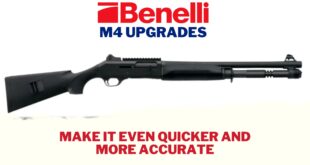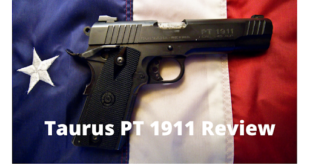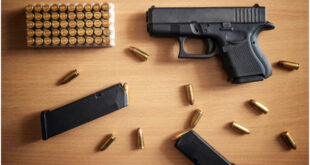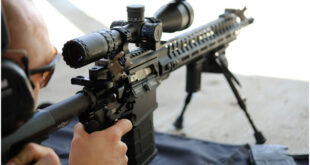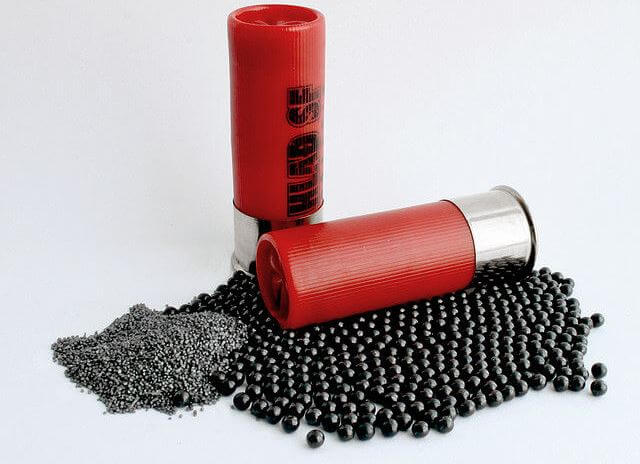
The shotgun is one of the most capable weapons that you can buy today, but no gun is perfect. You can’t expect that even a shotgun, an extremely capable weapon in it’s own right, is going to be able to do it all without the right care, maintenance, and of course the right ammo. When you use the right ammunition, then you are able to elevate the uses for a shotgun to everything from hunting to home defense, and even utilize it in military and law enforcement applications as well.
The search for great ammunition can be one that tires out even the most dedicated shotgun aficionado, but we’ve put together a comprehensive guide that helps answer some of the most common questions you’ll have when trying to find the right ammo for your shotgun (or the right shotgun to match the ammo that you’ll most likely want to use).
What Makes Up A Shotgun Cartridge?
Before we get into what kind of shotgun shell you should be buying, we need to examine what exactly comes in the cartridges that you are looking to buy. There are a few basic elements that make up the structure of a shotgun cartridge, including the:
- Hull / Casing
- Shot / Pellets (depending on the type of cartridge)
- Wadding
- Powder
- Primer
The structure of the cartridge will vary depending on the expected use and the manufacturer, but these five items will be seen on all shells that you will end up using in your shotgun. What size, weight, and type of materials being used will really impact the performance of the shell and the shotgun. The first thing that you’ll want to think about is the gauge of shell that you will end up using.
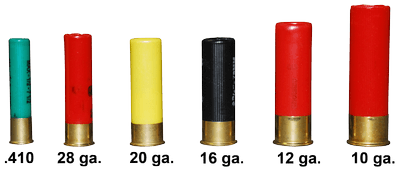
Choosing Your Ideal Gauge
While you might be used to thinking about the ‘size’ of the shot as the caliber, which is most commonly seen in rifles and pistols, shotgun shell sizes are largely determined by the ‘gauge’ of the shell. This gauge is determined by how many of the lead balls in the shell it would take to equal one pound. For example, if the shell is a 28 gauge shell, then it has balls in it that are 1/28th of a pound. Another way to think about these shells is by the diameter of the shot itself, which you can find below:
- 10 Gauge = 0.775 inches
- 12 Gauge = 0.729 inches
- 16 Gauge = 0.662 inches
- 20 Gauge = 0.615 inches
- 28 Gauge = 0.55 inches
You might not need to know the diameters of each shot to choose the right gauge, but understanding which gauge is right for your need is essential. There are two things that need to be considered when choosing a gauge: what you are going to be shooting at, and how much recoil you can handle. For example, if you are using a 12-gauge for hunting, then you’d better be looking to hit something large, because it’s going to be overpowered for small game or fowl. Similarly, a 20 gauge shot will be too small for large game, but it’s great for fowl and small game, and it has a lot less recoil than lower gauge options.
What Shot Should I Use In My Shotgun?
If you are considering the type of shot to use in your shotgun, you’re lucky in that there are only two different choices that you can make: shot and slug. Ultimately, the decision will be a bit more complex than flipping a coin however, so think about the type of shot in these terms:
Using A Slug
A slug is the best choice if you are looking to hunt, particularly if you aren’t able to use a rifle in that area, but you want a similar shot to a rifle. It’s also popular to use shot in a situation where you need less-than lethal ammo, like a bean bag round, which is why it’s popular to use a slug-based shotgun cartridge in law enforcement situations.
When To Use Shot
Shot is the more popular choice for a shotgun cartridge, both for shotgun enthusiasts and also when you think of someone firing a shotgun. In fact, you’d be hard pressed to see a shotgun being fired on TV or in movies using a slug, one of the reasons why using a slug is almost unheard of outside of those people who actually use shotguns regularly. Shot is popular specifically because it allows you to cover a wider area with pellets, allowing you to get a larger spread area, perfect for tracking fast moving targets.
The choice of shotgun ammo is something that is an extremely personal decision and dependent on the type of need that you have for a shotgun. How do you feel about using shot versus a slug? What is your favorite gauge to shoot? Let us know in the comments.
 www.GunsandOptics.com Tactical & Hunting Gear Review
www.GunsandOptics.com Tactical & Hunting Gear Review



